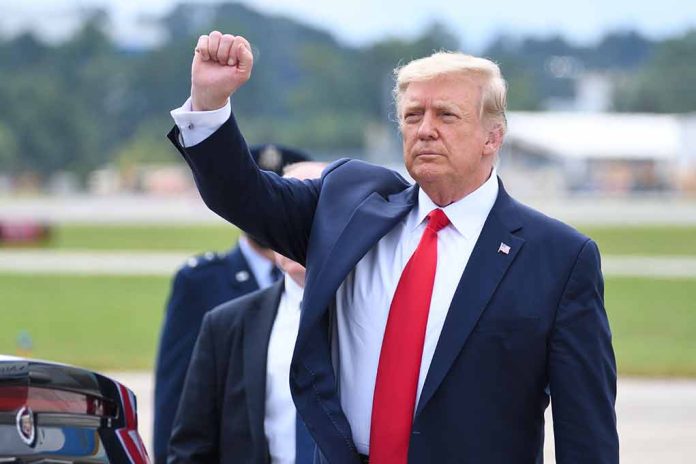
President Trump signed an executive order requiring proof of citizenship to vote in federal elections, setting the stage for a fierce legal battle over election integrity and access.
Key Takeaways
- Trump’s executive order mandates that voters provide proof of citizenship to register for federal elections and requires all ballots be received by Election Day.
- The order threatens to withdraw federal funding from states that don’t comply with its requirements within 30 days.
- Legal challenges are expected from voting rights groups and Democratic state attorneys general, citing potential disenfranchisement of eligible voters.
- Despite claims of widespread fraud, the Heritage Foundation found only 29 instances of noncitizens voting in federal elections from 2003 to 2023.
- The order directs the Department of Homeland Security to access state voter rolls to ensure accuracy and identify noncitizens who may have registered.
Executive Order Details and Implementation
President Donald Trump signed a sweeping executive order on elections that requires proof of citizenship to register to vote in federal elections. The order directs the federal Election Assistance Commission to mandate citizenship verification within 30 days. Additionally, it prohibits counting absentee or mail-in ballots received after Election Day, directly conflicting with current practices in 18 states and Puerto Rico that allow for post-Election Day ballot counting under certain conditions.
The order also instructs the Department of Homeland Security to access state voter rolls to verify accuracy and identify potential noncitizens. States that refuse to comply with these directives face potential loss of federal funding, creating significant pressure for rapid implementation. The directive specifically tasks DHS with compiling information on foreign nationals who may have registered or voted improperly.
WASHINGTON: President Trump signed an executive order mandating a citizenship question on federal voting forms, requiring proof of citizenship before voting. States risk losing funds if they don’t comply, and DOJ will crack down on election crimes. pic.twitter.com/wszkYj1Mym
— KolHaolam (@KolHaolam) March 26, 2025
Support and Opposition
Republican officials have largely praised the executive order as a necessary step to secure elections. Georgia Secretary of State Brad Raffensperger voiced his support, stating, “Thank you, President Trump, for this executive order ensuring that only American citizens decide American elections.” Several Republican-led states are expected to quickly implement the new requirements, viewing them as consistent with their existing efforts to strengthen election security.
However, voting rights groups have raised serious concerns about the potential disenfranchisement of eligible voters. According to data cited by these organizations, approximately 9% of voting-age citizens lack the documentation required to prove their citizenship status. Women who have changed their names after marriage may face particular difficulties if their birth certificates no longer match their current legal names.
Legal Challenges and Constitutional Questions
The executive order is expected to face immediate legal challenges from voting rights groups and Democratic state attorneys general. Colorado’s Secretary of State has already criticized the order as an unlawful federal overreach, highlighting the constitutional tension at play. The U.S. Constitution grants states primary authority over election processes, raising questions about whether the executive branch can impose such sweeping requirements without congressional approval.
The order also rescinds a 2021 executive order by former President Biden that aimed to increase voter registration across federal agencies. Trump has indicated that additional election-related actions will follow in the coming weeks as part of a broader effort to reform the electoral system according to his administration’s priorities. These anticipated measures suggest a comprehensive approach to restructuring election procedures.
Fraud Claims vs. Documented Cases
Despite claims about widespread noncitizen voting, documented cases remain extremely rare. The Heritage Foundation, a conservative think tank, identified only 29 instances of noncitizens voting in federal elections from 2003 to 2023. This statistical reality contrasts with the urgency conveyed in the executive order and related statements about election integrity. The order specifically criticizes current rules for not adequately enforcing existing prohibitions against noncitizen voter registration.
Some municipalities in states including California, Maryland, Vermont, and the District of Columbia currently allow noncitizens to vote in local elections, though federal law prohibits noncitizen voting in federal elections. The executive order takes direct aim at strengthening the enforcement mechanisms for this existing federal prohibition, presenting it as a critical matter of national sovereignty and democratic legitimacy.
Sources:
Trump signs broad elections order requiring proof of citizenship
Trump Signs Order Requiring Citizenship Proof to Vote in Elections



